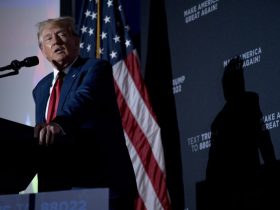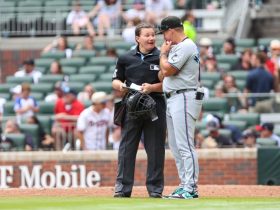A former U.S. Capitol Police officer who repeatedly messaged with a rioter from the Jan. 6 Capitol insurrection in the weeks after the attack, then deleted those messages when he learned he was being investigated, was sentenced Thursday to 120 days of home detention and two years of probation.
Michael A. Riley, 51, worked for Capitol Police for 25 years, and on Jan. 6, 2021, responded with his K-9 partner to the two pipe bombs left outside Democratic and Republican headquarters. He also provided medical assistance to a fellow officer injured during the riot. His lawyer cited Riley’s spotless career with Capitol Police as a reason for U.S. District Judge Amy Berman Jackson to impose probation, while prosecutors asked for 27 months in prison.
But Jackson was determined to hold Riley accountable for his actions in the two weeks after the riot, and for his testimony at trial last fall, in which he claimed he didn’t know that deleting his messages was a crime. “I don’t know if you were lying or just believed the story you were telling,” the judge told Riley, “but it wasn’t credible.”
Riley had struck up a Facebook friendship with Jacob Hiles, a Virginia Beach fishing boat captain, shortly before Jan. 6 because he liked Hiles’s videos and posts about fishing. But after Hiles entered the Capitol on Jan. 6, and then posted about it on Facebook, Riley sent him a message, which said: “Hey Jake, im a capitol police officer who agrees with your political stance. Take down the part about being in the building they are currently investigating and everyone who was in the building is going to be charged. Just looking out!”
Hiles didn’t feel he’d done anything wrong, and even encouraged Riley to investigate him, though that wasn’t Riley’s job. Riley’s message led to the first of two counts of obstruction of justice, for allegedly encouraging Hiles to destroy evidence, namely his Facebook post.
The jury deadlocked on that charge, with two jurors saying that they had voted 11-1 to convict but could not sway one holdout. Prosecutors then dismissed the charge rather than retry it.
It was Riley’s actions in the two weeks after the first message to Hiles that earned him a felony conviction for obstruction. By Jan. 9, 2021, colleagues had sent Riley photos of Hiles smoking marijuana inside the Capitol, expecting he’d forward them to investigators, but Riley didn’t. Then on Jan. 16, Hiles informed Riley that he was being charged. Riley messaged Hiles, “Call me,” and they spoke for more than 20 minutes, investigators found.
On Jan. 20, Hiles told the FBI that he’d been speaking to a Capitol Police officer, and let Riley know that “the FBI is curious about you.” Riley proceeded to delete hundreds of their Facebook messages, and on Jan. 21 crafted an angry message to Hiles saying he’d just learned about Hiles’s behavior in the Capitol, and he was ending their relationship.
“Talk about a complete lie,” the judge told Riley. “We’ve seen the messages. We know the real story.”
But Hiles hadn’t deleted his end of the conversations, which he provided to the FBI. He also didn’t delete his post detailing his actions on Jan. 6. Hiles said in an interview in October that he didn’t feel Riley had done anything wrong.
Hiles received two years of probation for trespassing at the Capitol. He is one of only six defendants, out of nearly 400 sentenced so far, for whom prosecutors did not recommend incarceration or home detention, and he received credit from the government for his cooperation against Riley.
Riley testified that he didn’t think a grand jury would investigate Hiles’s nonviolent actions, or the pair’s messages. Most protesters arrested by Capitol Police are charged with misdemeanors, with no grand jury involvement. Jackson noted that Jan. 6 was different, with protesters forced from the building rather than arrested, and then charged later.
Federal sentencing guidelines called for Riley to face a term of 15 to 21 months, but prosecutors wanted that enhanced for Riley’s alleged abuse of his official role and obstruction of justice, to a range of 27 to 33 months. Jackson denied the enhancements. The federal probation office recommended a year of probation, which defense lawyer Christopher Macchiaroli called the appropriate punishment.
“Overnight, because of his actions, self-inflicted,” Macchiaroli said, “he woke up and realized he was a national disgrace. Everything he’d done for 24 years before, that didn’t mean anything.” He said for a defendant arrested for the first time, for a nonviolent offense, who posed no threat to the community, Riley should “warrant a second chance, at probation.”
Riley told the judge: “The regret, the remorse I have over this situation is unmatchable. I reached out to someone I never should have contacted. For this, I accept full responsibility.” He said the arrest had cost him his job and his reputation, and he apologized to Capitol Police for any damage he’d done to the agency. He said he has suffered severe health consequences, which he attributed to the stress of the arrest.
The judge took note of Riley’s remorse, which she said she hadn’t seen before the sentencing hearing. She then proceeded to parse Riley’s defense that he hadn’t intended to hinder a federal investigation, noting his continuing interaction with Hiles even after he knew of Hiles’s actions inside the Capitol.
“It was shocking conduct for any member of law enforcement,” Jackson said, “but particularly one who was a member of the U.S. Capitol Police, and one who served on the day of the attack on the Capitol, the building you spent 25 years protecting.”
Still, Jackson went below the federal sentencing guidelines, as she did in four of her previous six felony sentencings, according to a Washington Post analysis of data. In addition to the four months of home detention and two years’ probation, she also ordered Riley to pay a $10,000 fine. Riley declined to comment after the sentencing.
Riley is the only Capitol Police officer to face a criminal charge related to Jan. 6. Other Capitol Police officers were criticized for their actions on Jan. 6, such as taking selfies with rioters, and the Capitol Police said last year they had disciplined six officers for conduct unbecoming an officer, failure to comply with directives, improper remarks or improper dissemination of information.








